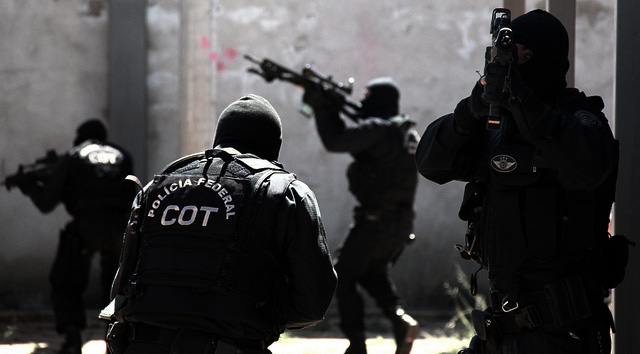
November 20 is Brazil’s Black Consciousness Day. However, for a group of black mothers in the city of Salvador, Bahia, this year’s action will not be about traditional black political questions like affirmative action or identity politics. Instead, they will host a silent protest in front of the Bahian governor’s office in honor of their children who have been killed or “disappeared” by the police. They will demand justice during a day of mourning and struggle.
The black community in Brazil is in a moment of crisis. Black Brazilians are three times more likely to be killed by the police than any other subset of the population and victims are often as young as 13 and 14 years old. Recently, the Brazilian Forum on Public Safety reported that Brazilian police kill approximately six people per day: 11,197 over the past five years. That compares to approximately 11,090 people killed by the police in the United States over the past 30 years. Yet these numbers are grossly underreported.
Records on police killings are voluntarily kept, produced internally and not reported by most cities. Moreover, the police do not record most of their killings as police-motivated homicides. Rather, they log them as “death caused by resisting arrest” (autos de resistência), a controversial category that allows police killings to be classified as “suicides” for all intents and purposes.
Furthermore, statistics do not take into account police death squads – secret, vigilante-style groups that kill young black people with impunity and hauntingly recall lynching in the United States. Police violence is a type of “serial killing” in Brazil, and the vast majority of the victims are black.
According to the 2012 Map of Violence in Brazil, black Brazilians are 132 percent more likely than their white counterparts to be the victims of homicide in Brazil. From 2002 to 2010, 272,422 Brazilians of African descent were murdered. If the statistics on police homicide are grossly underreported, and many of these killings are either left unclassified or misclassified as homicides unrelated to police action, then we can assume the crisis of racially biased police killing is much graver even than it appears.
Race is a matter of life and death in Brazil. The story of Matheus Alves dos Santos, 14, is one shocking example. Matheus was abducted and killed by military police in Rio de Janeiro on June 11, 2014. He was not suspected of a crime. They picked him up, terrorized him and two other friends, then shot and killed him. But Matheus’ story is not exceptional.
On June 22, 2013, Jackson, 15, was killed by a secret police death squad in Bahia. When family members reported the boy missing, the police refused to look for him. They claimed that the area where he disappeared was “too dangerous” for a search party. Jackson’s family found him days later – tortured, dismembered and buried in a shallow grave.
Black women are also the victims of police violence. On March 16, 2014, military police in Rio de Janeiro shot and severely wounded Cláudia Silva Ferreira near her home. They then stuffed her in the hatchback trunk of the police car to take her to the hospital. On the way to the hospital, she fell out of the trunk, and the officers continued to drag her behind the police car for 250 meters. She was dead on arrival at the hospital.
The injuries do not stop with the physical killing. Most black people killed by the police are also criminalized postmortem. The police said that Jackson was involved in drug trafficking even though his family adamantly denied that accusation. And they blamed Claudia’s death on a local drug war.
Beyond the killings, we also cannot discount the reverberating effects of state violence on the entire black community. Although black men are disproportionately targeted, shot and tortured by the police, black women die slowly from police terror. When black mothers lose children, they often develop severe health problems, including psychological disorders that hinder them from working or functioning in society. Death is not only physical.
There is a pattern of anti-black state violence going on in the Americas. We learned in August that the Ferguson police used the same tear gas canisters to quell protests in Missouri that the Israeli police use to confront Palestinian demonstrators. Similarly, the same lethal logics of racial profiling that frame our experiences here in the United States also dictate how the police engage with black citizens in Brazil.
As we search for answers, we must remember one thing: While our singular pain is crucial and devastating, as we work toward political responses to anti-black state violence, we must bear in mind that it is a global phenomenon.
4 Days Left: All gifts to Truthout now matched!
From now until the end of the year, all donations to Truthout will be matched dollar for dollar! Thanks to a generous supporter, your one-time gift today will be matched immediately. As well, your monthly donation will be matched for the whole first year, doubling your impact.
We have just 4 days left to reach our goals: raising $62,000 in one-time gifts and adding 930 new monthly donors.
This matching gift comes at a critical time. Trump has made it no secret that he is planning a demolition-style attack on both specific communities and democracy as a whole, beginning on his first day in office.
Help us prepare for Trump’s Day One, and have your donation matched today!